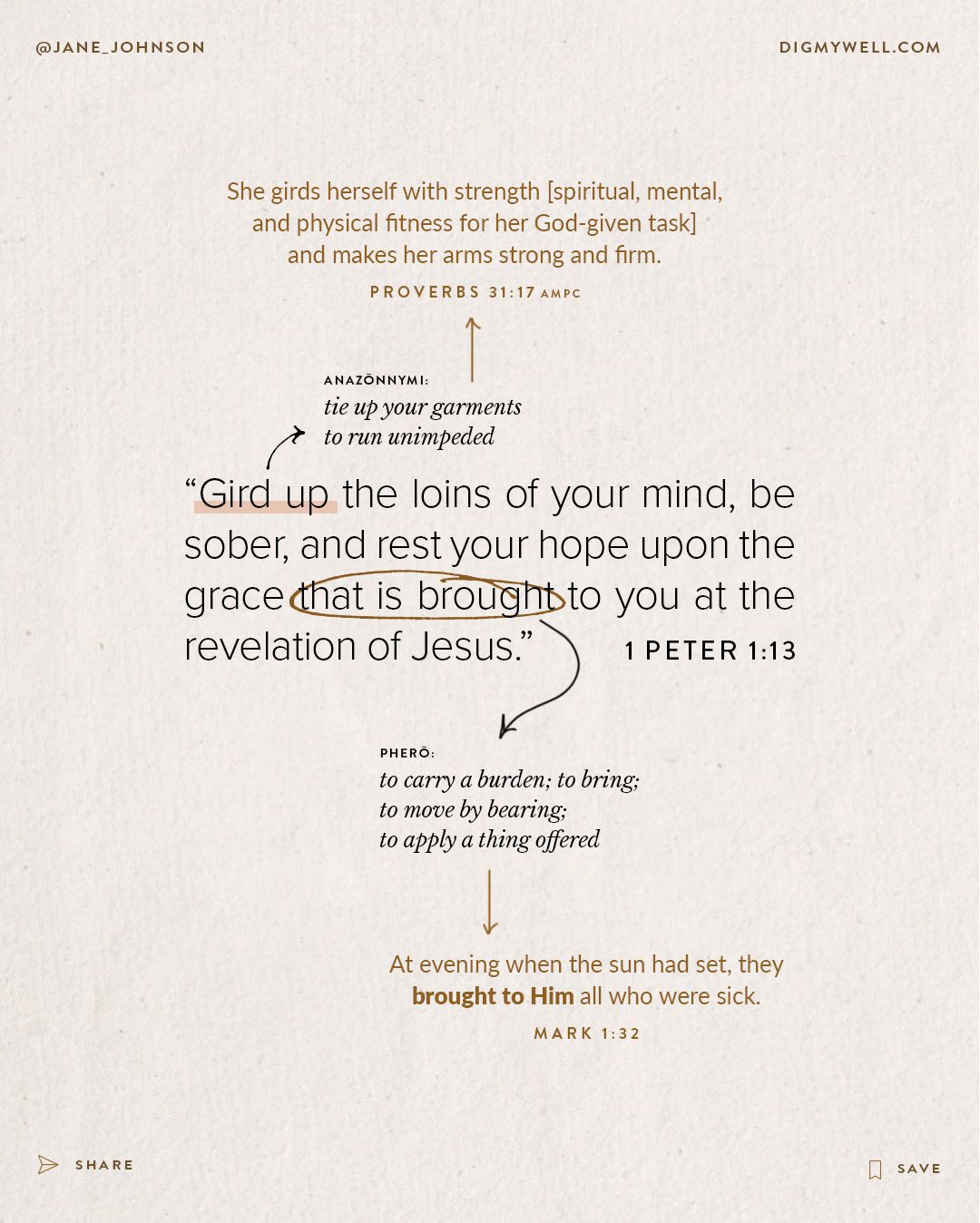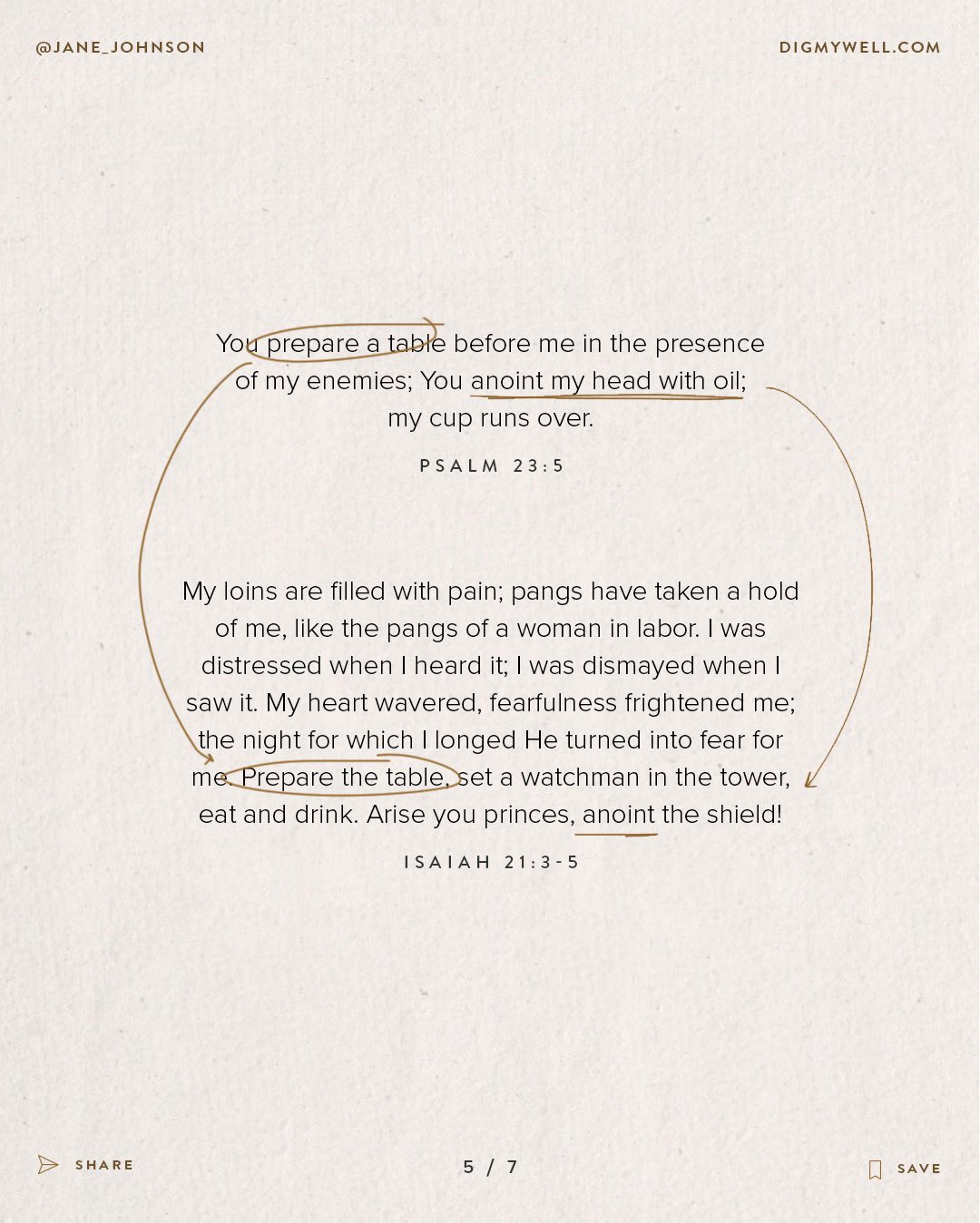I’ve been working on some new, expanded content for the School of Scripture the last couple of weeks (yes, the course I spent three years writing is about to get even better 🤩), part of which is a guided, “how to practically apply the system” walk-through example of 1 Peter.
I was intending to write the sample study guide for 1 Peter 1:13-21 when I got stuck on the first seven words of the passage. As I dug in, God spoke to me about my own right now, showing me some very specific things that were tripping me up and holding me back from really running after the calling He has placed on my life, unimpeded and distraction-free.
It begins with a passage pairing: 1 Peter 1:13 + Proverbs 31:17.
1. Gird your loins.
Let’s start with the 1 Peter 1:13 breakdown. If you read this verse in the context of its chapter, you know from verse one that 1 Peter is a letter written to believers scattered throughout the eastern region of ancient Asia Minor. So, when Peter uses the Greek word anazōnnymi in verse 13 for “gird up,” it makes sense that he uses a metaphor taken from an ancient Asian practice of pulling up their long, flowing (and, by default, ground-dragging) garments at the cusp of a journey or before working on a project, and then tied those robes tightly around their waist with a leather belt.
The point? To be unimpeded in their movement.
After ten full verses reminding those Asia Minor believers of the incorruptible and undefiled inheritance waiting for them in heaven, we get to the “therefore” part of verse 13: “Because of that promise,” Peter says, “tie up those loose, distracting parts of your mind to run unimpeded toward that end.”
With that in mind, hop over to Proverbs 31:17:
She equips herself with strength [spiritual, mental, and physical fitness for her God-given task] and makes her arms strong. proverbs 31:17 ampc
Now, where most translations read, “she girds (or equips) herself,” the King James Version reads, “she girds her loins.” The Hebrew word for “loins” is mothen. It describes the particular lower part of the back that a girdle wraps around. In modern language, it’s like Spandex. You can see three mothen in action in three places:
– Genesis 37:34, when Jacob put sackcloth around his mothen-waist, grieving the loss of his son.
– Psalm 66:11, and carrying the weight of afflictions on your mothen-back.
– Isaiah 21:3, and the center of birth pain for women in labor.
Tying those two verses together:
When it comes to your God-given task: – Proverbs 31:17
What lies are tripping you up? – 1 Peter 1:13
What is grieving you? – Genesis 37:34
What afflictions are distracting you? – Psalm 66:11
What are your birthing or growing pains? – Isaiah 21:3
Gird them up. Tie them up. Hold them up to God, who will roll them off you and onto Himself. And then? Get to the unimpeded work of fulfilling your calling.
2. Fill your cup.

Okay. So, You’ve girded your loins and tied up those loose ends in your mind that are impeding you from running in full spiritual, mental, and physical fitness for your God-given task. If you go back and read through to the end of 1 Peter 1:13, you’ll see a promise of grace that will be brought to you when Jesus arrives. But here’s the kicker: it’s delivered in the most beautiful kind of reciprocity.
Take a look at that pherō word, and you’ll see a pattern: over and over again, in the verses where pherō is used, the context is: “bring him to Me” and “they brought them to Him.” The diseased, the sick, the deaf, those with speech impediments, the blind, the mute: the people carried them to Jesus. And Jesus, in turn, healed them.
But it doesn’t stop there. He didn’t just heal them. He pherō-brought something to them in return:
“And suddenly there came a sound from heaven, as of a pherō-rushing mighty wind, and it filled the whole house where they were sitting, and they were all filled with the Holy Spirit” (Acts 2:2).
Please hear this: you don’t have to do anything to receive the grace of God – that’s the point of grace. But, in order to fully rest your hope upon that grace? It helps to understand the full picture pherō paints: You bring Jesus all the things. And in that emptied-out space you’ve made? He’ll fill with His Spirit.
And the how of it all? You can find that in Psalm 23:
“You prepare a table before me in the presence of my enemies; You anoint my head with oil; my cup runs over” (Psalm 23:5).
Now, hang with me here as I connect some dots. Remember the loins list from a couple of minutes ago? One of the verses was Isaiah 21:3, describing the loins as the center of birth pain for women in labor. And this Psalm 23 verse? It points back there, which loops us back to Proverbs 31:17 (and 1 Peter 1:13). Take a look:

And that oil anointing? It’s always a symbolic representation of the Holy Spirit. Speaking of, there’s one last thing I want you to see. It’s tucked into the footnote of the Amplified Version Classic Edition for Psalm 23:5:
“Athletes anointed their bodies as a matter of course before running a race. As the body, therefore, anointed with oil was refreshed, invigorated, and better fitted for action, so the Lord would anoint His “sheep” with the Holy Spirit, Whom oil symbolizes, to fit them to engage more freely in His service and run in the way He directs.”
When you gird your loins and sit at His table, He anoints you and He fills you and your cup runs over. But, when you look around at the distractions Satan has propped up, begging for attention? It drains you.
Filled or drained: it’s a daily choice where you put your mind. And, for me? I’m choosing the filling.
3. Run your race.
If you read Luke 2:25-28, you’ll meet Simeon – a man who spent his life waiting for the Messiah, who, God promised, he would see in his lifetime. So, he lived daily expecting the fulfillment of that promise. Then, one day, Simeon was moved by the Spirit to go to the temple where Jesus’ parents entered, and God fulfilled His promise to Simeon. He took the Messiah-babe up in his arms and praised, thanked (some translations say he prophesied), and blessed God. And the Greek word that’s used for “arms”? It’s agkalē, meaning “the curve or inner angle of a bent arm” with it’s root in agkos (a bend).
Later, in Hebrews 12:1, Paul says to lay aside every weight. When he wrote the words, he used a Greek word for “weight” that describes an unnecessary and prominent bulk, mass, or burden of any weight (heavy or light). The word, ogkos, is rooted in the same word used in Luke 2:28 for Simeon’s arm. The quick takeaway: The only weight we should carry with us daily is Jesus and the 2 Corinthians 4:17 weight of His glory. The rest? Lay it aside or, as Paul says, apotithēmi. It’s a compound word made up of apo (to separate one thing from another, destroying the union of the two) and tithēmi (to bend down, lay off, wear or carry no longer).
And, remember the “gird your loins” statement we started all of this with? It leads right into another “lay aside” statement, in 1 Peter 2:1. And the things he tells you to separate yourself from? They are all relational distractions. Malice and pretense, envy and hurtful talk (1 Peter 2:1 MSG) – they are the result of looking around at the people around you running their own races alongside you.
My preaching-to-myself point of it all? Stop looking around, draining your cup. Make the deliberate and daily choice to apo-separate your gaze that’s locked tight on what she is doing and apo-look to Jesus instead (Hebrews 12:2). The Greek language speaks of an active and continual turning of your eyes, giving more considerable attention to Him than you do to everyone else. Run your race because He is the author and finisher of your faith and your unique calling that’s altogether different from hers.
Just look to Simeon. He’s proof of it.


